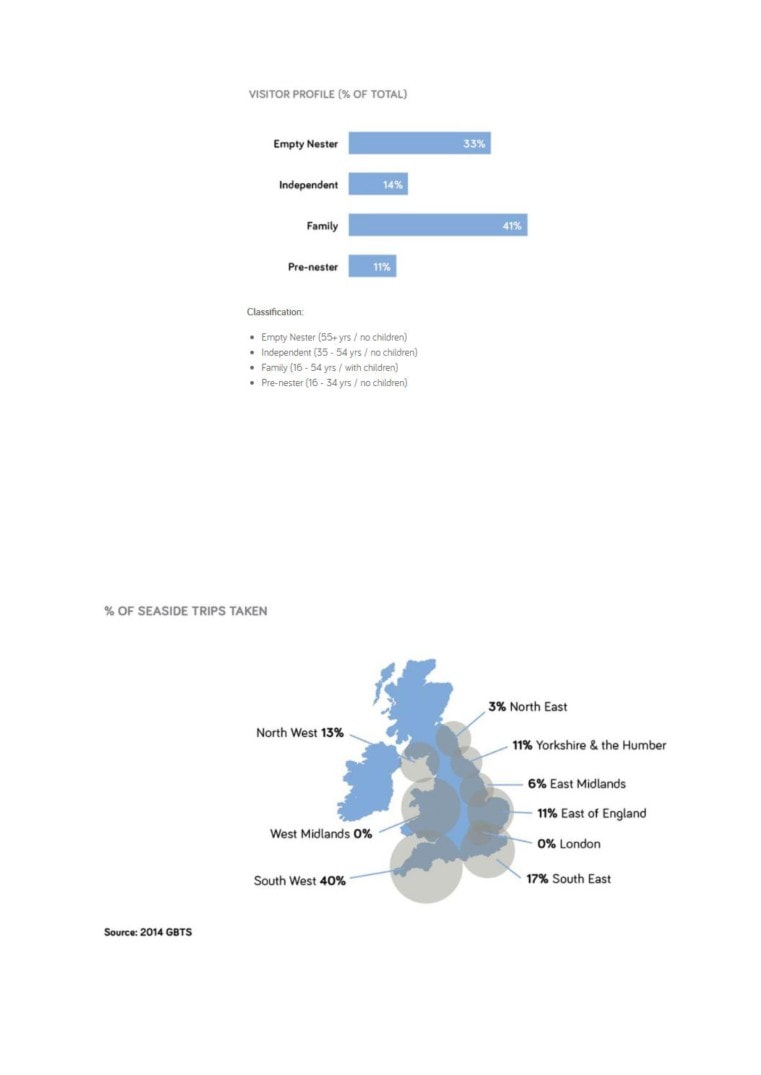Enabling Growth in the New
Anglia Visitor Economy Sector
through Skills Development
New Anglia LEP / Visit East Anglia -
Visitor Economy (Tourism) Skills Plan
April 2018
Page 2 of 43
Background Context
This Visitor Economy Sector Skills Plan has been developed with the Visitor Economy sector in Norfolk and
Suffolk, led by Visit East Anglia.
SkillsReach was contracted to facilitate and prepare eight sector skills plans for the New Anglia LEP priority
sectors. The project was commissioned by the Education and Skills Funding Agency, in partnership with New
Anglia LEP, and funded through the European Social Fund. Each Sector Skills plan and supporting Datapack has
been developed in collaboration with local employers and other stakeholders.
The Visitor Economy Sector Skills Plan has been developed in partnership with Visit East Anglia, the lead
organisation taking forward the further development and implementation of this plan in conjunction with New Anglia
LEP, local education institutions and other sector champions.
The New Anglia Skills Board places employers at the centre of decision making on skills in Norfolk and Suffolk to
ensure the skills system becomes more responsive to the needs of employers, residents and the future economy.
Visit East Anglia is an organisation that is business-led, and promotes tourism across East Anglia: Norfolk,
Suffolk, Essex and Cambridgeshire. It is consumer, customer and membership focussed to bring a unified tourism
voice to East Anglia. It works closely with Greater Anglia the new East Anglian rail franchise operator, and has
other links to major airports, seaports and other gateways in East Anglia and neighbouring counties. It is fully
aligned with the Tourism strategy for England. It supports businesses to reach out to markets with marketing and
PR opportunities, both domestically and internationally.
Visit Norfolk is the strategic voice of the Norfolk visitor industry and responsible for promoting all that the county
has to offer at local, regional and national levels. It aims to develop promotional campaigns and initiatives and work
with other DMOs to grow the county’s visitor economy. Visit Norfolk’s marketing activity is supported by local district
councils, the Broads Authority, and private sector partnerships including Visit Norwich, Enjoy the Broads, Visit
North Norfolk, Norfolk and Suffolk Tourist Attractions and Gt Yarmouth Tourism Business Improvement District. A
key objective is to encourage all the tourism organisations involved in promoting Norfolk to become more self-
sustaining and less reliant on public funding.
Visit Suffolk is the strategic voice of the Suffolk visitor industry working alongside DMOs to support tourism
development and engagement with local businesses, with the overall objective of continuing to increase visitor
numbers and spend within the county by promoting the Suffolk offer at a regional and national level. It aims to
develop promotional campaigns and initiatives and work with other DMOs to grow the county’s tourism economy.
One of Visit Suffolk’s key objectives is to encourage all the county’s tourism organisations involved in promoting
Suffolk to become more self-sustaining and less reliant on public funding.
SkillsReach is an established East of England-based strategic skills consultancy with an associate project team
with extensive experience of developing skills plans.
Acknowledgements
The New Anglia LEP wish to thank the employers, providers and stakeholders who contributed to the plan by
attending events or being interviewed
Page 3 of 43
Contents
Introduction (Indicative foreword)
4
The UK Visitor Economy Sector and its impact
4
New Anglia Visitor Economy Sector Strategy and Assets
5
How is the New Anglia Visitor Economy defined?
5
How was the Plan Developed?
6
Section 2: New Anglia Visitor Economy Sector Skills Plan
7
An Overview - Context
7
Drivers for Change
9
The Skills Plan - Overall Framework
10
Sector Leadership - Establish a skills voice for New Anglia
11
Priority 1 - ‘Developing the business and employment offer’
12
Intervention 1 - Marketing and Customer Engagement Capability
12
Intervention 2 - Innovation
12
Priority 2 - ‘Overcoming skills obstacles to growth’
13
Intervention 3 - Tackling Pressing Skills Shortages for Frontline, Chefs and Supervisory Staff
................................................................................................................................................................................13
Intervention 4 - Improved Career Pathways for New Entrants and Existing Workforce
13
Priority 3 - Promoting local and global career opportunities in the Visitor Economy
14
Intervention 5 - Inspiring Promotion of Career Opportunities for Young People and Adults
14
Alignment with Policies and Initiatives
15
Section 3: Understanding the Evidence Informing the Plan
16
Appendix
29
Appendix A - Consultation and development process
29
Appendix B - Current Skills and Training Provision - wider Visitor Economy
31
Appendix C - References
40
Page 4 of 43
Introduction (Indicative foreword)
‘Welcome to the Visitor Economy Sector Skills Plan for New Anglia. It sets out our collective
vision for how skills development can support the growth of the sector, increasing local
competitiveness and productivity, supporting inclusive economic growth and ensuring quality
careers in our exciting, high potential, sector are recognised, accessible and taken up by local
people.
Our plans align well with the recent UK Sector Tourism Deal bid in that:
• New Anglia is very well positioned as a potential ‘tourism zone’, collectively developing
our product as a 24/7/365 offer and building for the future
• Innovation is very important in terms of both embracing the most recent technologies to
boost productivity, connecting even better with our customers and developing engaging,
sustainable, career-friendly workplaces
• Skills is an absolute priority - we are up for the challenge of getting more people of all
ages motivated by, contributing to, and benefitting from, our dynamic exciting sector
This plan is a key step in the development of a regional collaboration between business,
localities and skills providers to ensure inclusive growth and skills opportunities are connected
and maximised for businesses and local residents. We look forward to this new partnership
shaping the future of a vibrant New Anglia Visitor Economy sector’.
Signed……
Chair
Visit East Anglia
The UK Visitor Economy Sector and its impact
Since 2010 tourism has been the fastest growing sector in the UK in employment terms. Britain
is forecast to have a tourism industry worth over £257 billion by 2025.- just under 10% of UK
GDP and supporting almost 3.8 million jobs, which is around 11% of the total UK number.
Tourism’s impact is amplified through the economy, so its impact is much wider than just the
direct spending levels. Deloitte estimate the tourism GVA multiplier to be 2.8 - meaning that for
every £1,000 generated in direct tourism GVA, there is a further £1,800 that is supported
elsewhere in the economy through the supply chain and consumer spending.
(https://www.visitbritain.org/visitor-economy-facts)
The sector is predicted to grow at an annual rate of 3.8% through to 2025 - significantly faster
than the overall UK economy (with a predicted annual rate of 3% per annum) and much faster
than sectors such as manufacturing, construction and retail.
Page 5 of 43
Section 1: Overall Ambition
Visit East Anglia: Our Ambition
Development of the year-round New Anglia Visitor Economy to grow overall value and
productivity; decreasing the reliance on traditional short-season ‘holiday-makers’ and
converting ‘day trippers’ to ‘stay’ visitors by:
1. Championing a consistent, contemporary customer service offer of the highest
standard
2. Encouraging job creation and increasing skills levels, salaries and career
potential
3. Encouraging the connection, communication and collaboration of local visitor
economy businesses to enable growth and development
New Anglia Visitor Economy Sector Strategy and Assets
The New Anglia area has one of the most comprehensive and diverse visitor offerings in the
UK, making it an ideal destination for all ages throughout the year.
Its natural capital includes 140 miles of coast, from pristine beaches to huge estuaries, two
Areas of Outstanding Natural Beauty, and The Broads National Park. Its built capital includes
many National Trust properties, The Queen’s rural retreat, fantastic museums and a wide range
of family attractions.
BBC Countryfile viewers recently voted Holkham the best beach in Britain, Springwatch has
been broadcast from Minsmere and Pensthorpe, Newmarket is the world-renowned home of
horseracing, Norwich one of the top shopping locations in England as well as being the best-
preserved medieval city, and there is a huge wealth of festivals, including The Norfolk &
Norwich, Latitude and Snape Proms.
This is an area where the visitor economy is worth £5bn a year overall, almost twice as much as
Cornwall’s, but has the potential for accelerated growth over the coming years.
Looking ahead, this sector locally is projected to grow in employment terms by over 11,000 jobs
(12 per cent, double the growth projected across the New Anglia economy) between 2014 and
2024.
How is the New Anglia Visitor Economy defined?
The definition of the sector used by New Anglia LEP covers Accommodation for visitors; Food
and beverage serving activities; rail, road, water and air passenger transport; transport
equipment rental; travel agencies and other reservation service activities, cultural activities;
sporting and recreational activities; country-specific tourism activities plus culture and the arts.
The sector can often be referred to as ‘Tourism’ with significant overlaps between ‘Tourism’ and
‘Cultural’ Sector activities such as heritage, sport, conferences and events. It is also worth
noting that there is some overlap between what is considered ‘tourism’ and that deemed ‘arts’ in
respect of cultural tourism.
Page 6 of 43
In terms of local skills planning for New Anglia, it was decided that the needs of the ‘tourism’
and ‘culture’ sectors are quite different and a sector plan for each was developed - led by Visit
East Anglia and the New Anglia Cultural Board respectively.
How was the Plan Developed?
The development process for the Visitor Economy Sector Skills Plan was overseen by the New
Anglia LEP and Visit East Anglia with significant input from Visit Norfolk and Visit Suffolk - both
as representative groups, and through individual employers and other stakeholders. An
advanced draft of the Plan was fully endorsed in principle by the Visit East Anglia Board at its
meeting on March 26 2018. There has been considerable consensus throughout from
consultees on the opportunities and challenges and the interventions prioritised in the Plan.
The development of the plan was also informed by individual consultations with sector
stakeholders including other key employers, national / local skills partners, local authorities and
New Anglia LEP. (See Appendix A).
In addition to this sector skills plan, a supporting Datapack has been produced outlining the
current workforce, trends in skills levels and how the local Visitor Economy sector in New Anglia
compares with other areas. (See Appendix B for the Current Skills and Training Provision). In
the main, this report aligns with the New Anglia Local Economic Strategy Visitor Economy
sector definition, although it also refers to other useful sources which are based on different
sector or geographical definitions. Highlights and key evidence can be found in summary format
in Section Three.
The Datapack also reports on the underlying socio-economic context for the sector locally and
reports on projected changes in future skills needs. It is presented as a separate document and
provides the data to underpin many of the comments made providing a more detailed reference
source in conjunction with the Skills Plan.
Page 7 of 43
Section 2: New Anglia Visitor Economy Sector Skills Plan
An Overview - Context
With a key, growing contribution to the New Anglia economy the Visitor Economy sector needs
to plan for the skills needed now and in the future.
Visit East Anglia: Our Ambition
Development of the year-round New Anglia Visitor Economy to grow overall value and
productivity; decreasing the reliance on traditional short-season ‘holiday-makers’ and
converting ‘day trippers’ to ‘stay’ visitors by:
1. Championing a consistent, contemporary customer service offer of the highest
standard
2. Encouraging job creation and increasing skills levels, salaries and career
potential
3. Encouraging the connection, communication and collaboration of local visitor
economy businesses to enable growth and development
The proposed actions are as follows:
Local sector leadership through stronger strategic partnerships with education and skills
providers
• Improving strategic collaboration with FE / HE partners, employers, DMOs, LEP and
DWP to establish a shared agenda to develop New Anglia as an Area of Excellence for
collaborative Visitor Economy skills development.
• bringing together private and public investment
• encouraging the development of, and support for, local provision
• providing a skills voice locally and nationally, working with the New Anglia LEP
• Informing on and promoting business development, innovation, collaborative pilots and
skills opportunities
Page 8 of 43
Priority 1. Developing the business and employment offer
1. Marketing and Customer Engagement Capability
2. Innovation
What Success looks like for Priority 1
Competitive advantage for Norfolk and Suffolk visitor economy businesses achieved through
‘connection, collaboration and innovation’ with contemporary workplaces that invest in and
realise their workforce and business potential
Priority 2. Overcoming skills obstacles to growth
1. Tackling Pressing Skills Shortages for Frontline, Chefs and Supervisory Staff
2. Improved Career Pathways for New Entrants and Existing Workforce
What Success looks like for Priority 2
Skills supply and development is a recognised strength of the New Anglia visitor economy,
with reliable, diverse, accessible pathways for local people
Priority 3. Promoting local and global career opportunities in the Visitor Economy
1. Inspiring Promotion of Career Opportunities for Young People and Adults
What Success looks like for Priority 3
Local people have a stronger understanding of the local and international career
opportunities provided by the Visitor Economy and can easily access those opportunities
through creative, proactive, ‘real’ work experience
This Sector Skills Plan will be led by a new sub group of the Visit East Anglia Board in
partnership with New Anglia LEP, Visit Suffolk and Visit Norfolk and local skills sector
stakeholders such as FE Colleges and DWP. This group will oversee sector skills development
and seek to be representative of all employment and skills interests.
Page 9 of 43
Drivers for Change
Barriers to overcome!
Opportunities to grasp!
A lack of a consistent local sector/employer
The sector is projected to grow in
voice on skills for the whole region making a
employment terms by over 11,000 jobs (12
cohesive national ‘pitch’ and representation
per cent, double the growth projected across
a challenge
the New Anglia economy) between 2014 and
2024. New jobs are relatively quickly created
and provide accessible opportunities for the
whole community.
Major concerns about filling immediate front-
New Anglia is well positioned to make a
line vacancies in areas such as
major contribution to the final UK tourism
housekeeping / bar-work with a concern that
sector deal, with clear regional leadership
this situation will be exacerbated
and close alignment locally with the sector
significantly by impending BREXIT
priorities identified in the national sector deal
bid.
Employers voiced concerns that young
Innovation through an enhanced digital offer
people consider tourism as a short-term job
at a region, destination and business level in
rather than a career and underestimate the
terms of marketing, customer engagement
exciting progression opportunities available
and potentially productivity gains
locally and globally
Rurality and seasonality of the sector -
‘Hospitality trades’ are providing the best
especially in coastal locations - make
opportunities for employment for those with
strategic skills investment and career
FE level skills based on a ratio of local
planning a real challenge
employer demand and supply of these skills
locally
Recruitment and retention of staff is a key
Destinations, businesses and workforces to
issue with turnover estimated as high as
embrace innovation / product development in
75%.
areas such as:
• Sustainable Tourism
• An authentic English Offer
• Local / national campaign connection
Skills shortages of trained Chefs and other
Collaborations with other destination
kitchen staff. Management shortage
partners such as Manchester, NCTA,
nationally, with 471,000 additional managers
Bournemouth, or over funding bids such as
needed by 2024
Coastal Communities Fund. Knowledge
Transfer Networks etc.
A view that the work environment for many
Opportunities stemming from the
tourism businesses needs to evolve to best
development of T Levels with substantially
engage with potential ‘millennial’ recruits-
increased requirements for work experience
e.g. work-life balance / career development
agendas
Lack of educational pathways in areas such
Opportunities to build on some outstanding
as Catering - e.g. recent removal of A Level
local practice such as the now national Hotel
pathway, local Hospitality Management
Takeover that was initiated in New Anglia
Degree
The Skills Plan - Overall Framework
Visit East Anglia - Our Ambition
Development of the year-round New Anglia Visitor Economy to grow overall value and productivity; decreasing the reliance on
traditional short-season ‘holiday-makers’ and converting ‘day trippers’ to ‘stay’ visitors by:
1. Championing a consistent, contemporary customer service offer of the highest standard
2. Encouraging job creation and increasing skills levels, salaries and career potential
3. Encouraging the connection, communication and collaboration of local visitor economy businesses to enable growth and
development
Sector Leadership - Establishing a skills voice for New Anglia
Priorities
Interventions
Success Indicators
1
1. Marketing and Customer
1
Engagement Capability
Developing the business and
Competitive advantage achieved
employment offer
through ‘connection, collaboration
2. Innovation
and innovation’
3. Tackling Skills Shortages
2
2
Overcoming skills obstacles to
Reliable, diverse, accessible
4. Local Career Pathway
growth
pathways for local people
Development
3
3
5. Promote Career
Promoting local and global career
Career opportunities profiled
Opportunities
opportunities
through creative, proactive, ‘real’
work experience
Sector Leadership - Establish a skills voice for New Anglia
Sector Leadership - The plan will be employer-led by a new, strategic,
collaborative private sector / skills partnership, adding value through:
• articulating the strategic skills priorities for the sector
• bringing together private and public investment
• encouraging the development of, and support for, local provision
• providing a skills voice locally and nationally
• Informing on and promoting business development and skills
opportunities
Rationale -
There is an excellent opportunity to create a New Anglia-wide, private sector-led
strategic skills voice for Norfolk and Suffolk; ‘connected in’ to the diversity of the
local Visitor Economy sector. The current lack of a consistent local
sector/employer voice on skills for the whole region makes local influence, a
cohesive national ‘pitch’ and business representation a challenge and a
competitive disadvantage.
Action to be Taken:
1. Establish a dedicated Skills Sub Group for the VEA Board; chaired by a
member of the main board and with representation of both employers and
skills stakeholders such as DMOs, Further Education, Universities, LEP,
DWP etc
2. Terms of Reference should position the Sub Group as not a skills delivery
body, but rather a catalyst and supporter of innovative ideas; a skills voice
for the sector; and a sponsor of collaborative pilots and initiatives
3. Identify immediate and longer-term opportunities for proactive, strategic
collaboration and local sector led skills initiatives
4. VEA implements targeted skills research of the whole membership base -
utilising resources such as Knowledge Transfer Networks
5. Ensure that New Anglia responds as a sector to skills opportunities relating
to Industrial Strategy Sector Deals
6. Work in partnership with New Anglia LEP to identify national and local
funding opportunities
Page 12 of 43
Priority 1 - ‘Developing the business and employment offer’
Intervention 1 - Marketing and Customer Engagement Capability
Rationale: VEA is currently proposing a digital solution for the whole New Anglia visitor
economy (including cultural sector) that will offer an overarching promotional, booking and
business-communications portal, supporting the development of a year-round visitor economy,
and providing business development and skills opportunities for all local visitor economy
businesses. Professional marketing skills were raised by consultees as a shortage area for local
businesses - large and small.
Action to be Taken:
1. The proposed VEA portal development provides an excellent opportunity to build overall
digital engagement with 7,000+ New Anglia Visitor Economy businesses - including a
Hub for visitor economy businesses to network and share best practise
2. Ensure close connections between ‘campaigns’ e.g. ‘Friendly Invasion’ and their
connection to any business skills implications - for example, the implications of a large
influx of American visitors
3. Establish the feasibility of the longer-term opportunity to build, through the portal,
customer service and local ambassador learning programmes - in collaboration with
partners such as DMOS and national partners such as Culture Partners (e.g. Marketing
Manchester), NCTA etc
Intervention 2 - Innovation
Rationale:
Recruitment and retention of staff is a key issue with national staff turnover estimated as high as
75%. Several consultees took the view that there are opportunities to develop the workplace
environment to enable tourism businesses to better engage, recruit and retain - especially
young people, but also people returning to work, people with additional needs and different
expectations of their workplace- e.g. flexible-working, adaptations, work-life balance, career
development.
There is also the opportunity for the sector, to benefit greatly from digitalisation in terms of both
productivity and business development capacity.
Action to be Taken:
1. Champion employers where engaging, contemporary employment practice has had
positive outcomes in terms of staff recruitment and retention, sharing best practice and
considering local awards showcasing great, engaging employers
2. Support businesses (particularly SMEs without their own HR/Skills functions) to develop
and lead engaging, flexible workplaces, supporting improved retention and career
development and embracing diversity
3. Targeted digital development support:
• at a strategic level to improve staff productivity through exploring new work methods,
working ‘smarter’ through innovative methods
• for marketing (especially smaller businesses) to optimise digital customer engagement
e.g. ‘managing online customer reviews’, Digital Eagle programme
4. Consider opportunities to share good practice and promote CPD through local leadership
insight events on matters such as waste minimisation, green tourism
Page 13 of 43
Priority 2 - ‘Overcoming skills obstacles to growth’
Intervention 3 - Tackling Pressing Skills Shortages for Frontline, Chefs and
Supervisory Staff
Rationale:
• Major concerns about filling immediate front-line vacancies in areas such as
housekeeping / bar-work with a concern that this situation will be exacerbated
significantly by impending BREXIT
• Skills shortages of trained Chefs and other kitchen staff. Management shortage
nationally, with 471,000 additional managers needed by 2024.
Action to be Taken:
1. Identify new recruitment channels / target audiences for current vacancies in
partnership with stakeholders such as DWP e.g. older workers / returners /
disadvantaged groups / retirees - with data evidence to focus upon one or two
groups that could constitute a greater part of the workforce
2. Scope out a programme of high-profile community campaigns such as the ‘Big
Hospitality Conversation’- style event in partnership with BHA / DWP / LEP -perhaps
targeting over 25s, where skills support e.g. apprenticeships are now more
accessible
3. Identify scope for strategic partnerships / potential sponsorships of excellent local
community/social enterprise initiatives such as Feed Norwich, Britannia Café, The
Clink, particularly seeking to extend opportunities beyond Norwich with the support
of local FE Colleges
Intervention 4 - Improved Career Pathways for New Entrants and Existing Workforce
Rationale:
Consultees raised examples of excellent provision and robust college/business
partnerships across the area, although also articulated some concerns about how ‘joined
up’ the education system is in terms of industry-connections, and whether young people
are work-ready and informed about the opportunities and dynamics of visitor economy
careers. Both business and skills sector consultees raised the lack of educational pathways
in areas such as Catering - e.g. recent removal of ‘A’ Level pathway, yet opportunities to
develop great practice in respect of the forthcoming ‘T’ Levels for which a local pilot
programme is currently being planned. It was regularly commented that Apprenticeships
are a ‘missed’ opportunity for the sector, with some businesses failing to find suitable
applicants and other larger businesses concerned about the lack of industry-specific
provision for higher / degree Apprenticeships. This situation was seen to be potentially
deteriorating with both full time degree and degree Apprenticeship options limited - due
either to a lack of sustainable demand or national ‘qualification ceilings’ on the sector
Action to be Taken:
1. With skills/FE sector partners, raise awareness of existing FE/ HE/ Apprenticeship
local pathways (Including forthcoming T Levels) to establish the evidence, and
opportunities for closer alignment with employers - e.g. both Levy-payers and SMEs
2. Establish the feasibility of a locally-led employer collaboration to identify
opportunities to aggregate demand for higher level apprenticeships (especially levy-
payer demand) in areas such as marketing / leadership
Page 14 of 43
Priority 3 - Promoting local and global career opportunities in the Visitor Economy
Intervention 5 - Inspiring Promotion of Career Opportunities for Young People and
Adults
Rationale: Employers voiced concerns that young people consider tourism as a short-term
job rather than a professional opportunity and underestimate the exciting, well-paid
progression opportunities available locally and globally. This is contributing to a lack of
people considering the Visitor Economy as a career - and insufficient recognition of the
breadth of broader professional jobs available in the sector - for example Marketing, HR,
Data Science professionals
Action to be Taken:
1. Ensure existing careers assets such as Icanbea….; Enterprise Advisors properly
understand and represent the Visitor Economy sector; links with Norwich and
Ipswich Opportunity Areas
2. Consider new career campaigns based upon countering unhelpful public
stereotypes about the sector - both to potential applicants but also to the wider
community
3. Evaluate and expand practical, experiential ‘Hotel /Restaurant Takeover’-style
initiatives as a way of providing very powerful work experience across the region in
partnership with FE Colleges
Page 15 of 43
Alignment with Policies and Initiatives
Priority 1
Priority 2
Priority 3
Alignment
Intervention 1
Intervention
Intervention
Intervention
Intervention 5
Marketing and
2
3
4
Promotion of
Customer
Innovation
Skills
Improved
Careers
Engagement
Shortages
Career
Capability
Pathways
Careers &
✓
✓
Enterprise
Company
ESF
✓
workforce
development
Icanbea
✓
✓
Industry 4.0
✓
Innovate UK
✓
National
✓
✓
Careers
Strategy
New Anglia
✓
✓
Cultural
Sector Skills
plan
New Anglia
✓
✓
Growth Hub
New Anglia
✓
✓
Youth Pledge
Norwich/
✓
✓
✓
Ipswich
Opportunity
Areas
Modern
✓
✓
✓
✓
✓
Industrial
Strategy
(Tourism
Sector Deal
Bid)
UK
✓
✓
✓
✓
✓
Hospitality
People 1st
✓
✓
✓
✓
(including
career
mapping tool)
Visit Britain
✓
✓
Page 16 of 43
Section 3: Understanding the Evidence Informing the Plan
Section 3 is divided into Sector Leadership, then the three Priorities with their
corresponding interventions. In each category, the employer/stakeholder views are
presented first.
Sector Leadership- Establish a skills voice for New Anglia
Employer/Stakeholder Views
• There are many effective local and/or specialist sector groups and initiatives,
but the overall picture is quite fragmented and lacks a clear voice, and pitch at
a regional and national level
• The formal education and training system (e.g. through FE) is vital although
the importance of in-house training - generally non-accredited- can be under-
estimated and ‘under the radar’
• Major recruitment challenges in isolated, rural areas such as the North Norfolk
and Suffolk Coasts - seen as an influence on ‘investment withdrawal’
• Recognition that course development, and the underpinning funding model, is
unwieldy
• Visitor economy businesses not always benefitting from funded business and
skills support - either due to eligibility (e.g. ERDF) or simply low-
awareness/demand
• A relatively high proportion of lifestyle businesses in the sector makes
wholesale transformation a challenge
• Some of the challenges faced are ‘infrastructure-related’ and cannot be
tackled on a sector basis - for example, housing costs in visitor economy
‘hotspots’ such as Wells-next-the-Sea/Southwold: a lack of public transport;
poor broadband connections
National Data
• Since 2010 tourism has been the fastest growing sector in the UK in
employment terms.
• Britain will have a tourism industry worth over £257 billion by 2025 - just
under 10% of UK GDP and supporting almost 3.8 million jobs, which is around
11% of the total UK number.
• Tourism’s impact is amplified through the economy; it being much wider than
just the direct spending levels. Deloitte estimates the tourism GVA multiplier
to be 2.8 - meaning that for every £1,000 generated in direct tourism GVA
there is a further £1,800 that is supported elsewhere in the economy through
the supply chain and consumer spending.
• The sector is predicted to grow at an annual rate of 3.8% through to 2025 -
significantly faster than the overall UK economy (with a predicted annual rate
Page 17 of 43
of 3% per annum) and much faster than sectors such as manufacturing,
construction and retail.1
Local Data
The Visitor Economy in New Anglia
In terms of Gross Value Added (GVA) then the Visitor Economy in 2015 was worth
directly approximately £2.32bn, which equates to just over 7 per cent of the total
New Anglia economy. This is an increase of nearly £450m on 2010 (24 per cent)
which is broadly in line with growth across the whole economy. Both the tourism (21
per cent) and cultural (28 per cent) elements of the sector experienced economic
growth over this period.
In total the sector currently employs 89,100 people, which is approximately 11 per
cent of the workforce. Employment in the sector has grown by 14 per cent since
2010 (around 10,700 jobs), a rate of growth which is above that experienced across
the New Anglia economy. This however masks a drop in employment of 1,800
between 2014 and 2015.
Tourism accounts for 78,200 jobs with Culture and The Arts providing 26,300 jobs
(noting that the two do not sum to 89,100 due to the overlap in the sectors in
‘Cultural’ and ‘Sporting & Recreational’ activities). As for the various sub sectors then
‘Food and beverage serving activities’ is by far the largest with 38,200 workers,
followed by ‘Accommodation for visitors’ (16,300), and ‘Sporting and recreational
activities’ (12,500). It is worth noting that it is the two largest sub sectors which have
experienced the largest drops in employment between 2014 and 2015 totalling
approximately 7,000 jobs.
With regards to the structure of employment, then the Visitor Economy sector is
much more geared towards part-time employment. 48 per cent of employment in the
sector is part-time compared to 29 per cent across the whole economy
In terms of enterprise numbers, as of 2016 there were 7,140 Visitor Economy
enterprises operating in the New Anglia area, or just under 12 per cent of all
enterprises. Since 2010 the number of Visitor Economy enterprises has increased by
630, or around ten per cent, in line with the total New Anglia rate of growth.
However, this growth rate is below that experienced regionally (13 per cent),
nationally (17 per cent), and by some comparator LEP areas such as Dorset (15 per
cent).
The following is based on analysis of LEP level results for the sectors of ‘Hotels and
restaurants’ and ‘Arts and other services’ from the UKCES Employer Skills Survey
2015.
‘Hotels and restaurants’ employers have on average more vacancies than locally,
regionally, and nationally. However, these are less likely to be Skills Shortage
1 Visit Britain. Britain’s Visitor Economy Facts.
Page 18 of 43
Vacancies (SSVs) and could point to high levels of churn in staff. ‘Arts and Other
Services’ employers are more likely to have a vacancy that is hard to fill.
‘Hotels and restaurants’ employers are more likely to have staff that are not fully
proficient, again symptomatic of high staff turnover. The opposite is true of ‘Arts and
Other Services’ employers.
Performance against training measures (such as the provision of training in the last
year, and on-the-job training) of ‘Hotels and restaurants’ employers is below local,
regional and national averages for all indicators apart from online or e-learning
training. Conversely, training days per trainee, and trainee days per staff, are both
much higher than all other comparators.
‘Hotels and restaurants’ employers are more likely to report difficulties in retaining
staff, with ‘Arts and Other Services’ employers more likely to report underutilised
staff.
The following makes use of data and findings available via the online toolkit
from the UKCES ‘Working Futures’ programme and job vacancy data from the
Labour Market Insight tool developed by Burning Glass.
Job vacancy postings during 2015 for the Visitor Economy in New Anglia generally
required school leaver and FE skills with very little in the way of postings requiring
Higher Education level skills.
Advertised salaries for the sector in New Anglia were also generally lower than those
advertised regionally and nationally.
‘Hospitality trades’ are seen as providing the best opportunities for employment for
those with FE level skills based on a ratio of local employer demand and supply of
these skills locally. In terms of HE level skills, then New Anglia provides better
opportunities than regionally or nationally for those looking for employment in ‘Sports
Occupations’.
A Future View of the Visitor Economy
Looking ahead and using information from both the East of England Forecasting
Model, and the UKCES Working Futures model, then the sector is projected to grow
in employment terms by over 11,000 jobs (12 per cent, double the growth projected
across the New Anglia economy) between 2014 and 2024.
Much of this growth in employment is set to be delivered by the ‘accommodation and
food services’ element of tourism with 10,000 jobs. ‘Arts and entertainment’ will grow
by over 2,000 jobs over the same period whilst the media elements of the sector are
set to shrink by around 1,000 jobs.
At the same time the Visitor Economy is growing there will be a significant amount of
existing jobs to replace as people leave the sector workforce. Over the period 2014 -
2024, replacement demand is expected to be somewhere in the region of 37 -
Page 19 of 43
40,000 jobs. This places a net requirement for jobs requiring to be filled in the sector
at around 50,000.
-10,000
-5,000
0
5,000
10,000
15,000
20,000
25,000
QCF 7-8
QCF 4-6
QCF 3
QCF 2
QCF 1
No Qual
Expansion Demand
Replacement Demand
Much of this replacement demand is centred on Level 3 (A level and equivalent)
roles and below though Level 4 to 6 (HE to First degree level) roles also feature
strongly. In terms of new jobs created (expansion demand) then this will be primarily
in Level 4 roles and higher with job losses in Level 1 (GCSE below grade C) roles
and below.
Lack of Private Sector Skills Voice
The consultation process identified a potentially fragmented situation with a number
of different groups with strong sector interests at either a county level(e.g. Visit
Suffolk and Visit Norfolk); a local level (e.g. DMOs. coastal communities teams); or
with a special interest areas such as the Horseracing cluster around Newmarket or
groups linked to heritage or other visitor attractions).
Page 20 of 43
Priority 1 - Developing the Business and Employment Offer
Intervention 1 - Marketing and Customer Engagement Capability
Employer/Stakeholder Views
• A lack of connectivity currently between marketing / product development and
any underpinning skills considerations
• The need to connect at a locality level and be responsive to the needs of
local/specialist elements such as Horseracing around Newmarket or Cultural
Tourism
• The importance of digital skills within the small business community so
important to this sector - especially social media / online marketing, but also
the need strategically to look at ways of boosting productivity and raising job
value through technology
• Positive comments about Welcome Host / World Host / Ambassador-style
initiatives although viewed as ad hoc and ‘stop/start’ and therefore reducing
the longer term impact
• Interest in online learning development potential for local ambassador-type
provision
Product/Market Development
• Travellers want ‘authenticity’ and an opportunity to learn or self-improve2;
there could be a gap in businesses marketing English food and/or running
courses in how people can learn to make English food (this could be cooking
dishes, but also typical English food products) or trips to places where
authentic English food/drink is made as a tour. It could also be authentic
English crafts; this is a need for skills-training mostly in how to market English
authenticity to appeal to tourists.
• With 70% of UK people wanting more information about how environmentally
friendly a brand is, and 95% of people worldwide concerned about the
environment3, showing a tourism business to be sustainable and
environmentally friendly could give them a competitive edge, as well as being
better for the environment too and reducing energy consumption etc.
Businesses may need training on how to be more sustainable, and how to
market this; for example, they could work towards gaining a ‘Sustainable
Tourism Certificate’. There is advice available on reducing food waste.
• For Rural Tourism, there is a Rural Tourism Business Toolkit that has been
created as part of the COOL Tourism Project by the COOL Partnership and
tourism development charity Hidden Britain, with various modules to work
through, if anyone needs help/support in this area.4
• See below analysis of the visitor profile for coastal tourism, demonstrating
perhaps the changing balance between families and empty nesters, with
knock-on skills implications in terms of target markets and customer needs.
2 Visit Britain. The Future Travel Journey: Trends for Tourism Product Development
3 Visit Britain. Maximising Your Sustainability.
4 Visit Britain. Maximising Your Sustainability.
Page 21 of 43
Source: cited in National Coastal Tourism Academy
National Significance of Seaside Trips
The national significance of the New Anglia (termed East of England below)
coastline in relation to ‘seaside trips’ is shown below and is important in terms of
wider Visit East Anglia ambitions to extend ‘day trips’ to longer stays.
Source: National Coastal Tourism Academy (NCTA)
Page 22 of 43
Intervention 2 - Innovation
Employer/Stakeholder Views
• Damaging perceptions of the sector as a source of short term, zero hours,
seasonal, low paid work rather than being a career option with a wide range of
professional roles - for example Data Science for sophisticated online
consumer engagement
• There may be scope for considerable business innovation in areas such as
staff engagement, flexible working, culture development as a business
differentiation strategy to improve recruitment and retention
Digitalisation
• People booking their holidays online is increasing and is predicted to
continue to rise to 63% by 20235; therefore, companies will need to offer
smooth booking online services, and ideally have the ability to book and
communicate through social media apps such as WhatsApp and Facebook
Messenger too. Businesses may need skills-training in technology, social
media and conversational commerce.
• Travellers want an immersive interactive experience, with audio-tours,
Augmented Reality (AR) and Virtual Reality (VR). Businesses may need
skills-training in how to implement audio-tours, AR and VR.
• Attractions have said “we can’t afford to do a lot of advertising”6 - so perhaps
businesses need training in social media, which is less expensive to gain a
competitive edge.
• Attractions mentioned that they struggle “because of a lack of funding”7 so
they may benefit from training in how to search/apply for funding.
Customer Service
• There are a variety of Customer Services courses/qualifications available
such as local Ambassador programmes, WorldHost, Welcome Host etc.8
• A lot of businesses are acknowledging that they want ‘softer skills’ in
hospitality and tourism.9
•
“Skills gaps are particularly noticeable for chefs, house-keeping and more
generally for customer service and other soft skills.”10
• Seasonal staff need to be developed and invested in, regardless of the
seasonal nature of their work.11
5 Visit Britain. The Future Travel Journey: Trends for Tourism Product Development
6 Visit Britain. Tourism Business Monitor 2017. Wave 4 - Post Christmas and New Year. Full Report.
7 Visit Britain. Tourism Business Monitor 2017. Wave 4 - Post Christmas and New Year. Full Report.
8 People 1st. WorldHost Training.
9 Kent, Martin-Christian. People 1st. The Chef Shortage: A Solvable Crisis? Understanding why we have a chef
shortage and how it can be addressed. Executive Summary.
10 National Coastal Tourism Academy (NCTA) - Coastal Visitor Economy: Vision, Strategy and Action Plan (Jan
2017)
11 National Coastal Tourism Academy (NCTA) - Coastal Visitor Economy: Vision, Strategy and Action Plan (Jan
2017)
Page 23 of 43
•
In another Insight report by People 1st, which focussed on Customer Service
Skills (Dec. 2016) they stated “High levels of staff turnover are
exacerbating skills gaps in the existing workforce, as staff aren’t
remaining in post long enough to become fully competent.”12(p.4) People
1st predict that as unemployment decreases, it will be harder for employers to
gain people with the skills they require.
•
The report by KPMG state that “People 1st estimate organisation level
turnover to be 30% in the sector … our survey of BHA members puts the
estimate as high as 50.2%.”13
•
For tourism staff working in coastal communities, it is still important that
they’re given training, even if their work is seasonal, because otherwise skills
will not be retained.14
•
The visitor economy sector has a rapid turnover of staff (75% compared
to the usual 15% average)15
•
There are things such as ‘Fast Track’ and the Service Profit Chain that can
help tourism and hospitality staff to feel more valued, perform better, and to
grow the business and profit.16 In People’s 1st ‘Skills and Workforce Profile:
Hospitality and Tourism’ (Dec. 16)17 it suggests that there are skill shortages
because there are not many people with the skills; not enough people are
interested in learning the skill; people are put off by shift work/unsociable
hours; not enough people are applying for the jobs. The skills that were
lacking were interpersonal and employability skills: 66% not able to manage
own time and prioritise tasks; 61% lacking customer handling skills; 55%
lacking team working; 47% lacking the specialist skills or knowledge to
perform the role and 46% lacking sales skills.
•
KPMG have noted that whilst “there may be some scope to reduce the
sector’s labour force requirements through productivity improvements and
automation, however extensive productivity gains are unlikely to be possible
due to the manual nature of many of the roles and the demand from
customers for the human interaction that typifies the sector.”18
•
“16.2% of BHA (UK Hospitality was created in 2018 by a merger of the
Association for Licensed Multiple Retailers (ALMR) and the British Hospitality
Association (BHA) to provide a strong unified voice for the industry) members
surveyed felt that there was a gap in the skills and experience between EU
12 People 1st. Insight Report: Customer Service Skills (Dec. 2016)
13 KPMG. Labour Migration in the Hospitality Sector: A KPMG Report for the British Hospitality Association.
(March 2017)
14 National Coastal Tourism Academy (NCTA) - Coastal Visitor Economy: Vision, Strategy and Action Plan (Jan
2017)
15 People 1st. Race to improve productivity in hospitality and tourism - rising costs, recruitment difficulties and
Brexit create perfect storm. (July 2017).
16 National Coastal Tourism Academy (NCTA) (n.d) [online] FastTrack: Addressing employee pay and
progression in coastal SMEs
17 People 1st. (Dec. 2016) Skills and Workforce Profile: Hospitality and Tourism.
18 KPMG. Labour Migration in the Hospitality Sector: A KPMG Report for the British Hospitality Association.
(March 2017)
Page 24 of 43
and UK workers. The most common skill gaps … related to language skills
and customer service skills.”19
Priority 2 - Overcoming Obstacles to Growth
Intervention 3 - Tackling Skills Shortages
Employer/Stakeholder Views
• A real shortage of ‘good quality staff’ - particularly in frontline areas such as
housekeeping, bar-staff, waiters
• Anecdotal comments about the difficulty of recruiting and retaining qualified
Chefs
• Concerns about the impact of BREXIT across the whole workforce
• Challenges recruiting higher level marketing, leadership and digital (including
Maths for coding/developers) skills
Immediate Front Line Shortages & BREXIT
• There ‘could’ be a shortage of housekeeping staff in 2019 after Brexit, if there
are difficulties in recruiting EU workers. Because EU workers currently make
up at least 28% of housekeeping staff, though People 1st suspect the figure is
more. Hotels and accommodation providers need to consider and prepare for
this. This is also echoed by the BHA (UK Hospitality was created in 2018 by a
merger of the Association for Licensed Multiple Retailers (ALMR) and the
British Hospitality Association (BHA) to provide a strong unified voice for the
industry), who would like the government to have a 10-year phased approach
for industries reliant upon service workers from the EU, to give time to recruit
UK workers.20 In a report by KPMG commissioned by the BHA, “75 per cent of
waiters and waitresses, 25 per cent of chefs and 37 per cent of housekeeping
staff are from the EU.”21
• There is a disparity between what students are taught and what they’re
required to do in the workplace: “In college I am being taught different skills
and I go into the workplace and have yet to be asked to use any of them. I
also notice the difference in what I’m taught and then what I’m expected to
know, or what I should know.”22 - Chef student.
• Skills Retention - is an issue in the Tourism and Visitor economy for several
reasons. Firstly, EU staff may be impacted by Brexit, and the skills they bring
to this area, may not be retained if they’re predominantly done by EU workers.
If EU nationals have specific language skills, these too may be lost.23 The
Tourism response paper highlighted that EU nationals working in the tourism
19 Ibid.
20 British Hospitality Association (BHA) - Recommendations for Government
21 BHA. Hospitality and Tourism industry announces first post-Brexit sector skills strategy (March 31st, 2017).
22 Kent, Martin-Christian. People 1st. The Chef Shortage: A Solvable Crisis? Understanding why we have a chef
shortage and how it can be addressed. Executive Summary.
23 People 1st. Understanding the impact of Brexit on housekeeping teams.
Page 25 of 43
sector in the UK have excellent, “customer service, culinary and language
skills.” 24
• Attractions also mentioned “we haven’t got the staff resources”25
• Tourism and Hospitality businesses have training needs in how to increase
productivity.26
• The British Hospitality Association (BHA - UK Hospitality was created in 2018
by a merger of the Association for Licensed Multiple Retailers (ALMR) and the
British Hospitality Association (BHA) to provide a strong unified voice for the
industry), commissioned KPMG to undertake an independent report, they
predicted “the hospitality sector faces a recruitment shortfall of upwards of 60k
per annum workers from 2019.” and “based on this scenario, by 2029, the
hospitality sector could face a total recruitment gap of over 1 million workers.”
They also added that “the hospitality sector currently needs around 62,000
new EU migrants per annum to maintain its current activities and grow.”27
Their analysis shows that “12.3% employees in the UK’s hospitality sector are
EU nationals” with “43% of lower level occupations in the hospitality sector are
filled by EU nationals.” KPMGs research looked at the reasons for the level of
EU nationals currently hired, and their largest reason was “lack of interest in
work from local UK labour,” with jobs being perceived as not attractive or
undesirable.
Chef Shortage
• There is a severe shortage of Chefs, with 11,000 predicted to be needed in
the next five years.28 There are plenty of student chefs, but they’re not
entering or staying in the profession; plus 20% of existing chefs are also
leaving. 64% of businesses said that” they can’t find applicants with the
required skills, which means we are not just dealing with a labour shortage,
but a skill shortage.”29
• People 1st recommend changing the perception of jobs in the visitor economy.
There is evidence that trainee chefs don’t enter the workforce and that
existing chefs don’t stay in their jobs - this means that all these skills aren’t
being retained and utilised. Amongst many interventions People 1st
recommended: maximising opportunities from FE Colleges and creating a
quality workplace.30
24 Tourism Industry Council - Brexit Response Paper: Tourism Industry Responses for the Tourism Industry
Council (December 2016)
25 Visit Britain. Tourism Business Monitor 2017. Wave 4 - Post Christmas and New Year. Full Report.
26 People 1st. Race to improve productivity in hospitality and tourism - rising costs, recruitment difficulties and
Brexit create perfect storm. (July 2017).
27 KPMG. Labour Migration in the Hospitality Sector: A KPMG Report for the British Hospitality Association.
(March 2017)
28 People 1st. The Chef Shortage: A Solvable Crisis? New People 1st Report Urges Joined-up Approach (29 Nov
2017)
29 Kent, Martin-Christian. People 1st. The Chef Shortage: A Solvable Crisis? Understanding why we have a chef
shortage and how it can be addressed. Executive Summary.
30 People 1st. The Chef Shortage: A Solvable Crisis? New People 1st Report Urges Joined-up Approach (29 Nov
2017)
Page 26 of 43
•
“Chefs and front of house staff are the two most frequently cited hard-to-fill
roles during KPMG’s interviews with BHA members.”31
Manager Shortage
• There is a management shortage in the Visitor Economy, with 471,000
additional managers needed by 202432. Apprenticeships and Higher
Education could help, as well as ensuring current managers are suitably
skilled.
• A report by People 1st The performance and talent management revolution:
Driving productivity in hospitality and tourism shows that recruitment and
retention of staff is a huge issue in the tourism sector, with turnover being
75%. Perhaps there’s a skills need here, to ensure that people are recruiting
the ‘right’ staff who want to make a career out of tourism, and therefore will
stay working in this environment and that staff are performance managed, and
have excellent opportunities for learning and development.33 It has been
highlighted that management skills are certainly an area for development, so
that manager can motivate and retain staff. It’s beneficial to recruit graduates
to management positions and to offer higher-level apprenticeships.
Businesses may need training about apprenticeships and the higher-level
options.
• Martin-Christian Kent, suggested that managers need training to “manage,
motivate and retain staff”34 - by retaining staff, the investment in training and
skill development and experience would also be retained and not lost.
Intervention 4 - Local Career Pathway Review and Development
Employer/Stakeholder Views
• Questions about the likelihood of those on tourism courses actually building
careers in the sector
• Concerns that recent Apprenticeship reforms are not supporting increased
demand for Apprenticeships - by either employer of individual
• A view that educational provision is not as well connected to industry as it
could be
Skills Supply and Demand in the Visitor Economy
31 KPMG. Labour Migration in the Hospitality Sector: A KPMG Report for the British Hospitality Association.
(March 2017) UK Hospitality was created in 2018 by a merger of the Association for Licensed Multiple Retailers
(ALMR) and the British Hospitality Association (BHA) to provide a strong unified voice for the industry.
32 People 1st. What do our future managers look like? How much autonomy will they have and how will they
manage?
33 People 1st. Race to improve productivity in hospitality and tourism - rising costs, recruitment difficulties and
Brexit create perfect storm. (July 2017).
34 Kent, Martin-Christian. (June 2017). The Performance & Talent Management Revolution: Driving Productivity
in Hospitality and Tourism. Executive Summary.
Page 27 of 43
In line with the local population, the Visitor Economy workforce in New Anglia is
becoming higher skilled as analysis of 2001 and 2011 Census data shows. However,
in terms of this shift in qualifications then New Anglia still lags a bit behind regional
and national averages for the sector.
2011
14%
17%
22%
16%
18%
13%
2001
24%
20%
25%
11%
13%
7%
2011
13%
17%
22%
16%
20%
12%
2001
22%
21%
26%
11%
13%
7%
2011
12%
15%
20%
17%
24%
12%
2001
21%
19%
24%
11%
17%
7%
0%
100%
No qualifications
Level 1 qualifications
Level 2 qualifications
Level 3 qualifications
Level 4 qualifications and above
Apprenticeships and other qualifications
The following analysis is based on data sourced from the Department for Education’s
Further Education data library. The Sector Lead Bodies identified as being the most
relevant to the Visitor Economy are: Hospitality, Leisure, Travel and Tourism;
Creative and Cultural; Creative Media; and Passenger Transport.
In total, 10,410 learning aims related to the Visitor Economy were delivered to New
Anglia residents in 2012/13. This formed 13 per cent of all known learning aims
delivered in New Anglia, compared to 12.4 per cent nationally. If we consider all
learning aims delivered (i.e. including those classed as ‘unknown’ then these figures
fall to 4.9 and 4.5 per cent respectively).
Compared to 2010/11, when the number of learning aims delivered to New Anglia
residents was 10,830, then numbers are down for all sector lead body elements of
the Visitor Economy apart from ‘Creative Media’. Overall, this results in there having
been a slight drop (-4 per cent) in the number of Visitor Economy learning aims
delivered to New Anglia residents over the period in question. Nationally, and over
the same period, learning aims for the sector increased by seven per cent.
The clear majority of these learning aims (8,260 or 79 per cent) achieved by New
Anglia residents were delivered by New Anglia based providers. This is slightly more
than the average for New Anglia (75 per cent).
Provision of Visitor Economy learning aims by New Anglia providers to New Anglia
residents has increased over the period in question, from 6,520. Growth has been
strongest in the elements of ‘Hospitality, Leisure, Travel and Tourism, and ‘Creative
and Cultural’. So, whilst Visitor Economy learning aims have fallen slightly in New
Anglia, local provision to local learners has still grown in demand, and at 27 per cent
is much higher than national growth (seven per cent).
Page 28 of 43
In terms of apprenticeships, then in 2015/16 there were 510 starts in ‘Leisure, Travel
and Tourism’ apprenticeships in New Anglia, which is a reasonably small proportion
(four per cent) of all apprenticeship starts in the area. Growth over time in ‘Leisure,
Travel and Tourism’ apprenticeship starts is below that of regional and national
comparators, and that of growth in apprenticeship starts overall. However, if we
consider recent data on apprenticeship participation by sector then the Visitor
Economy accounted for 12 per cent (2,580) of all apprenticeships in 2014/15
(compared to 10 per cent) which is much more in line with the amount of
employment it provides (11 per cent).
Priority 3- Promoting Local and Global Career Opportunities
Intervention 5 - Promote Career Opportunities
Employer/Stakeholder Views
• Perceptions that the public do not view key roles such as Chefs / Waiters as
‘valued professionals’ as is the case in continental Europe
• Support for initiatives giving real insight and experience such as National
Hotel Takeover Week. The Big Hospitality Conversation
National Data
Modern Industrial Strategy: Tourism Sector Deal Bid. Tourism: a leading
industry for the Government’s future economic planning35
•
“A clear plan to extend the seasons, making British tourism product more
efficient, for longer.”
•
“upskilling in digital and use of new technology.”
•
“A big, industry-led, 10-year campaign to shift perceptions about tourism and
hospitality jobs and to encourage more people to join the industry.”
•
“Tourism and hospitality to be included in Government’s new T-Levels and
apprenticeship schemes.”
•
“To get many more industry figures out into schools and colleges to promote
the industry.”
• There are also leadership programmes if graduates want to go into Hotel
management.36
• There is a drive to get young people into working in hospitality, through the
Big Hospitality Conversation37, with the BHA, and DWP, and National
Apprenticeship Services and other partners.
• People 1st Career Mapping Tool.38
35 Visit Britain. Modern Industrial Strategy: Tourism Sector Deal. Tourism: a leading industry for the
Government’s future economic planning. (2017)
36 IHG - Spotlight on: Future Leaders Programme
37 BHA. The Big Hospitality Conversation. UK Hospitality was created in 2018 by a merger of the Association for
Licensed Multiple Retailers (ALMR) and the British Hospitality Association (BHA) to provide a strong unified
voice for the industry.
38 People 1st - Career Mapping Tool
Page 29 of 43
Appendix
Appendix A - Consultation and development process
The development process for this Visitor Economy Skills Plan was sponsored by
Visit East Anglia; actively involving Visit Norfolk and Visit Suffolk - at a collective
level and also through individual discussions with their stakeholders The original aim
was to produce an integrated Visitor Economy Plan for ‘Tourism’ and ‘Culture’, but
local stakeholders saw more benefit in developing separate plans - particularly due
to the fact that skills priorities are seen as very different in the two sectors. An
advanced version of this Skills Plan was endorsed by the Visit East Anglia Board at
its March 2018 Board Meeting and skills planning was discussed with both Visit
Norfolk and Visit Suffolk stakeholder meetings. An additional stakeholder meeting
was also held in March at the Royal Norfolk Showground.
In addition to this sector skills plan document, a supporting Datapack has been
produced which outlines the current workforce in the sector, trends in its skills levels
and how the local Visitor Economy sector in New Anglia compares with other areas.
This Datapack also reports on the underlying socio-economic context for the sector
locally and reports on projected changes in future skills needs and current student
numbers. It is presented as a separate document and provides data to underpin
many of the comments made in the sector plan and is a useful reference source
when read in conjunction with the plan.
Thanks in particular to the following stakeholders for their support, ideas and
contribution to this process.
In the Task and Finish consultations, and through one to one consultations with
employers and stakeholders the key questions posed were:
Question 1 - Current and Future Skills Supply and Demand
What are the key skills issues facing the Visitor Economy Sector in New Anglia?
This could include for example:
• Workforce supply or demographics
• Skills supply
• New technology
• Recruitment and retention
• Nature of training and education provided (courses and providers)
Question 2 - Proposed Skills Actions
What are the key actions which are needed to address anticipated skills & workforce
challenges in the Visitor Economy Sector in the next 5 years?
This could include for example:
Page 30 of 43
• New provision by Schools, Colleges or Universities
• New centres for training or education
• New models of delivery e.g. Higher Apprenticeships
• Groups of employers working together to procure training and skills development
• Careers advice and guidance
• New funding models
• Workforce development programmes
Discussions focussed on both short term quick ‘wins’, as well as longer term more
strategic interventions and on the basis of co-investment between the private and
public sectors.
Consultees
A series of key informant interviews were conducted with a mix of employers, sector
skills providers and representative bodies. In total over 30 consultees were
interviewed in depth and/or attended the task and finish consultation meetings held
or provided other direct input which has informed the plan (presentations at events,
referrals, links to reports).
The consultation process has also included reviewing the feedback collected from
other key sectors of the New Anglia economy for which sector skills plans have been
developed. Additional input, advice and guidance was received from officers of the
LEP and County Councils:
The Visit East Anglia Board which
Particular thanks also to the following for
acted as sponsors for this plan
their direct input and support:
included:
Richard Ellis (Chair): Original
Visit Norfolk stakeholders
Cottage Co.
Visit Suffolk stakeholders
Sean Clark: Clark St James
Newmarket Equine Cluster stakeholders
Victoria Savory: Adnams PLC
Simon Altham: Hoseasons
Tom Blofeld: Bewilderwood
Robert Gough: Gough Hotels / Southwold Pier
Martin Dupee: ZSEA
Bill Heath: IHG / Holiday Inn
Chris Scargill: Larking Gowen
Chris Couborough: Flying Kiwi Inns
Pete Waters: Visit East Anglia
Amanda Parker: Fred Olsen Travel
Victoria Norris: Woodland Holiday Park
Valerie Watson-Brown: Tasty Flavours
Barbara Greasley: Norfolk Broads Direct
Andy Hutcheson: Norfolk County Council
Steve Thorpe: City College, Norwich
Natasha Waller/ Kenny Lang: New Anglia LEP
Holly Loxham: Visit East Anglia
Eve Cronin/Jan Feeney: Norfolk County
Council
Michael Gray / Jazz Joolia: Suffolk County
Council
Page 31 of 43
Appendix B - Current Skills and Training Provision - wider Visitor Economy
The listing below is not exhaustive but is intended to give an overview of the range of
provision available in Norfolk and Suffolk. The courses listed have a Visitor Economy
focus (including Tourism and Hospitality, as well as Culture) because they fall within
the New Anglia Visitor Economy definition with some provision relevant to both
areas.
University of East Anglia (UEA)
Tourism/Hospitality
• MA Agriculture and Rural Development (full and part-time)
• MA Landscape History
Culture
• BA History of Art with Gallery and Museum Studies
• BA Society, Culture and Media
• MA Cultural Heritage and Museum Studies (full and part-time)
• MA Media, Culture and Society (full and part-time)
• BA & MA in Film and Television Studies
University of Suffolk (UoS)
Tourism/Hospitality
• BA (Hons) Event Management
• BA (Hons) Event and Tourism Management
• BA (Hons) Tourism Management
• BSc (Hons) Wildlife, Ecology and Conservation Science
• FdA Hospitality and Event Management
• FdSc Wildlife Conservation and Animal Management
Culture
• BA (Hons) Dance
• BA (Hons) Digital Film Production
• MSci Football Coaching
• MA Professional Practice in Heritage Management
• MSci Performance Analysis for Football
• BA (Hons) Photography
• BSc (Hons) Sport Coaching
• BSc (Hons) Sport Performance Analysis
• BSc (Hons) and MSci Sport Psychology
• BSc (Hons) Sport and Exercise Science
• FdA Commercial Arts Practice
Page 32 of 43
• BSc (Hons) Sport
• FdSc Sport, Health and Exercise
• BSc (Hons) Sport, Health and Exercise
• FdSc Sports Coaching and Development
Norwich University of the Arts (NUA)
Culture
• BA (Hons) Animation
• BA (Hons) Architecture
• BA (Hons) Design for Publishing
• BA (Hons) Fashion
• BA (Hons) Fashion, Communication and Promotion
• BA (Hons) Film and Moving Image Production
• BA (Hons) Fine Art
• BA (Hons) Games Art & Design
• BA (Hons) Illustration
• BA (Hons) Photography
• BA (Hons) VFX
• MA Communication Design
• MA Curation
• MA Fashion
• MA Fine Art
• MA Games
• MA Moving Image and Sound
• MA Photography
• MA Textile Design
City College Norwich (CCN)
Tourism/Hospitality
• Entry Level - Supported Learning - Hospitality Enterprise
• L2 - Culinary Skills City College Norwich Hotel School Diploma
• L2 - Food Safety in Catering Award
• L2 - Health & Safety in Workplace (QCF)
• L2 - Award in Wines and Spirits
• L2 - Commis Chef Apprenticeship
• L2 - Intermediate Apprenticeship in Customer Service
• L3 - Advanced Apprenticeship in Customer Service
• L3 - Award in Wines and Spirits
• L3 - Culinary Skills City College Norwich Hotel School Diploma
• L3 - Team Leader Apprenticeship
• A Touch of Patisserie and Confectionary - part time adult learning
Page 33 of 43
• Junior Chef, Gluten Free Chef, Gastro Chef, Great British Bake Off, Junior
Chef Academy Summer, Student cookery, Italian cookery - other part time
courses
• BA (Hons) Hospitality and Events Management
Culture
• Entry Level - Supported Learning - Creative Media Pathways
• L3 - Advanced Apprenticeship in Creative & Digital media
• L3 - Advanced Apprenticeship in Digital Marketing
• L3 - Art & Design (Art, Textiles, Photography) A Level
• L3 - Coaching
• L3 - Drama & Theatre Studies A Level
• L3 - Film Studies A Level
• L3 - Media Studies A Level
• L3 - Access to Higher Education: Art & Design
• Digital Photography for beginners - part time adult learning
• L4 - Advanced Nutrition for Physical Performance - part time
• BSc (Hons) Applied Sport, Health and Exercise
College of West Anglia
Tourism/Hospitality
• L1 - Business and Tourism
• L1 - Hospitality Certificate
• L1 - Professional Cookery
• L2 - Animal Care Practical Skills
• L2 - Catering and Hospitality Apprenticeship (Intermediate)
• L2 & L3 - Customer Service Apprenticeship
• L2 - Hospitality Services Diploma
• L2 - Professional Cookery
• L2 - Team Leading - Apprenticeship - Workplace
• L2 - Technical Certificate in Animal Care
• L3 - Advanced Technical Diploma in Animal Management
• L3 - Hospitality Supervision and Leadership Diploma - Workplace
• L3 - Hospitality/Supervision Apprenticeship (Advanced) - Workplace
• L3 - Professional Cookery
• L3 - Professional Cookery - Confectionery & Patisserie
• L3 - Travel and Tourism - Extended Diploma
• Sugarcraft - Further Techniques - part-time
• BSc (Hons) Tourism Management (full or part-time) - recently discontinued
Culture
• Entry Level - Bridge to Sport
• L1 - Sport & Leisure Instructor Diploma
• L2 & 3 - Performing Arts (Acting, Dance or Musical Theatre)
Page 34 of 43
• L2 - Sport - Activity Leadership and Coaching - Apprenticeship - Workplace
• L2 - Instructing Exercise and Fitness - Diploma
• L2 - Sport Leisure Operations - Apprenticeship - Workplace
• L3 - Art and Design A Level
• L3 - Film A Level
• L3 - Media A Level
• L3 - Photography A Level
• L3 - Sport Leisure Management - Apprenticeships - Workplace
East Coast College
Tourism/Hospitality
•
Entry 3 Certificate in the Introduction to the Hospitality Industry
•
L1, L2, L3 in Animal Care and Management
•
L1 - Aspire to Catering
•
L1 - Food and Beverage Service
•
L2 - Air Cabin Crew - C&G Level 2 Diploma in Air Cabin Crew (with First Aid,
and Basic Sea Survival)
•
L2 - Apprenticeship in Customer Service
•
L2 - Apprenticeship in Hospitality (Food and Beverage Service)
•
L2 - Apprenticeship in Hospitality (Front of House Reception)
•
L2 - Apprenticeship in Hospitality (Hospitality Services)
•
L2 - Apprenticeship in Hospitality (Professional Cookery)
•
L2 - Apprenticeship in Hospitality (Food production and cooking)
•
L2 - Apprenticeship in Team Leading
•
L2 - Award in Beer and Cellar Quality (Cask and Keg) ESF
•
L2 - Award for Personal Licence Holders
•
L2 - C&G Food Safety
•
L2 - Food and Beverage Service
•
L2 - Hospitality and Catering
•
L2 - Professional Cookery or Kitchen Services
•
L3 - Apprenticeship in Customer Service
•
L3 - Apprenticeship in Hospitality (Professional Cookery)
•
L3 - Apprenticeship in Hospitality (Supervision and Leadership)
•
L3 - Diploma in Professional Cookery
•
L3 - Certificate in General Patisserie and Confectionery
•
L3 - CIEH Award in First Aid at Work
•
L3 - Diploma in Hospitality Supervision and Leadership
•
Working in Travel Diploma or Extended Diploma
•
FdSc Wildlife Conservation and Animal Management
Culture
•
Entry 3 Certificate in Skills for Sport and Active Leisure
•
Access to Art, Design and Photography
•
L2 - Certificate in Fitness Instructing
Page 35 of 43
• L2 & 3 in Film Production, TV & Animation
• L2 - Performing Arts (Musical Theatre)
• L2 - Sport
• L3 - Performing Arts (Music Theatre)
• L3 - Extended Diploma in Sport (or Sport & Exercise Science)
• FdSc Sport, Health and Exercise
• BA (Hons) in Arts Practice
East Norfolk Sixth Form College
Tourism/Hospitality
• L3 - Travel and Tourism BTEC
Culture
• L2 , L3 and L4 - Art & Design
• L2 & 3 Sport and Exercise Science
• L2 - Performance Skills
• L3 - Dance
• L3 - Drama and Theatre Studies - A Level
• L3 - Elite Football (Male)
• L3 - Film Studies A Level
• L3 - Media Studies A Level
• L3 - Music Technology
• L3 - Performing Arts
• L3 - Photography A Level
• Level 2 & 3 Video Production
Easton and Otley College
Tourism/Hospitality
• Advanced Apprenticeship in Customer Service
• L1 - Diploma in Countryside & Conservation
• L2 - Certificate in Practical Animal Care
• L2 - Diploma in Countryside - Arboriculture Pathway
• L2 - Diploma in Countryside & Environment
• L2 - Diploma in Work Based Environmental Conservation
• L3 - Advanced Technical Extended Diploma in Animal Management
• L3 - Diploma in Animal Care (Zoos/Wildlife Establishments)
• L3 - Diploma in Countryside Management
• L3 - Extended Diploma in Countryside Management (Gamekeeping)
• L1, 2 & 3 Diplomas in Horticulture plus Intermediate and Advanced
Apprenticeships
• Customer Service Practitioner
• FdA Landscape & Garden Design
• FdSc Animal Science & Welfare
Page 36 of 43
• FdSc Ecology & Conservation Management
• FdSc Wildlife Management & Conservation
• Foundation Certificate in Food Safety
• HACCP
• Health & Safety Level 2
• Intermediate Apprenticeship in Customer Service (Farm Shops)
• Intermediate Certificate in Food Safety
• BSc (Hons) Animal Science & Welfare
• BSc (Hons) Wildlife Management & Conservation
• Lots of short course on Conservation (coppicing, hedgelaying)
• BsC (Hons) Zoology with Conservation
Culture
• Advanced Apprenticeship in Leisure Management
• Advanced Apprenticeship in Sport Development
• Intermediate Apprenticeship in Activity Leadership
• Intermediate Apprenticeship in Leisure Operations
• There are level 2 & 3, football, tennis and rugby academies.
• L1, L2 and L3 - Diploma in Sport
• FdSc and BsC in Coaching Science
• Short courses on sports, fitness and leisure training
Suffolk New College
Tourism/Hospitality
• L1 - C &G Diploma Introduction to Professional Cookery
• L2 - C&G Certificate in Patisserie
• L2 - C&G Technical Certificate in Food Preparation and Service
• L2 - C&G Technical Certificate in Food & Beverage Service
• L2 - Diploma in Travel and Tourism
• L3 - C&G Advanced Technical Diploma in Supervision in Food and Beverage
Services
• L3 - C&G Diploma for Professional Chefs
• L3 - C&G Diploma in Patisserie
• L3 - Extended Diploma in Travel and Tourism
Culture
• L1 & L2 & L3 - Diploma in Art & Design
• L1 - Diploma in Media
• L1 - Diploma in Performing Arts
• L2 - Diploma in Health, Fitness & Exercise Instruction
• L2 - Diploma (and Extended) in Music Performance and Production
• L2 - Diploma in Performing Arts
• L2 - Diploma in Sport
• L3 - C&G Advanced Technical Diploma in Beauty and Spa
Page 37 of 43
• L3 - Extended Credit Diploma in Media
• L3 - Extended Diploma in Sport
• L3 in Performing Arts
• L3 Extended Diploma in Photography
• L3/4 - Foundation Diploma in Art & Design
West Suffolk College
Tourism/Hospitality
•
Professional Cookery VRQ1 and VRQ2
•
L1 - Business Tourism and Events Diploma
•
L1 - Catering Certificate
•
L2 & 3 Animal Care & Management courses
•
L2 - Commis Chef
•
L2 - Customer Service Practitioner
•
L2 - Hospitality Operations NVQ
•
L2 - Hospitality Team Member
•
L2 - Travel and Tourism Extended Certificate
•
L2 HABC Award in Food Safety in Catering
•
L3 - Hospitality and Events Management
•
L3 - Hospitality Supervisor
•
L3 - Award in Service Improvement
•
L3 - Professional Chefs Advanced Technical Diploma
•
L3 - Travel and Tourism Extended Diploma
•
L3 & L5 & L7 - Certificate/Award in Leadership & Management
•
ConLPG Training (Leisure Accommodation Vehicles (LAV1), Boats (BOAT1)
can be undertaken as additional assessments.
•
Customer Service Excellence - 1 day workshop
•
Introduction to the Role of the Professional Taxi and Private Hire Driver
•
Taxi and Private Hire Driving Practical Assessment
•
Junior Chef Programme - Introduction Level
Culture
• L1, L2 and L3 - Sport Diploma
• L1, L2 and L3 - Art and Design Diplomas
• L2, L3 - Beauty and Spa Therapy
• L2 & L3 - Film and Creative Production
• L2 & L3 - Performing and Production Arts Diploma
• L3 - Performing Arts (Dance) Extended Diploma
• L3 - Performing Arts (Musical Theatre) Extended Diploma
• L3 - Production Arts (Technical Theatre) Extended Diploma
• L3 - Sport and Exercise Sciences Extended Diploma
• L3 - Working in Sport and Active Leisure Diploma
Page 38 of 43
• Short courses - Intro to Photography or Pakistani Cuisine
• Art Practice BA (Hons)
• Creative and Commercial Music Production BA (Hons)
Theatre Royal Norwich
Culture
• Norfolk Schools Opera Project - primary schools
• Performance based Workshops - Northern Ballet Aged 8yrs & up
• Pre-performance talks
• Youth Theatre Company (aged 16 - 20)
• Writing for Audio Drama
• Young Producers
• Work Experience
• Junior Acting Courses - on Saturdays (aged 7 - 16)
• Stage Two - Learning and Skills Centre - education/theatre skills training
• Backstage Tours
• Adult Courses 25yrs+ - Introduction to Acting; Introduction to Scriptwriting;
Physical Theatre Workshop and a Dance Masterclass
• There are Exam Courses
• Drama Classes called ‘Little People’s Drama’ - aged 4-7yrs.
Ipswich Regent Theatre & Corn Exchange
Culture
• Tea walks (eg. William Leggett’s Legacy; or the Wonderful Women of Ipswich;
or From Clothier to Crowell Square; Artists, Poets & Performers )
• Study Days (eg. Thomas Wolsey)
• Culture and Cake
• The Big Lego Ipswich Build
• Summer Musical Theatre Workshop 2018
New Wolsey Theatre
Culture
• Junior Youth Theatre (aged 7 -11)
• Senior Youth Theatre ( aged 11-16)
• Youth Theatre Squared - disability or additional needs (aged 11-20)
• Young Company (aged 16 - 22)
• Weekly skills and development sessions for under 22yr old
• Short courses for 16 - 25year olds on directing, writing or technical skills.
• Taster sessions
• School and College activities - creative learning workshops and lounges
• Schools touring productions
• Youth perform festival
Page 39 of 43
Dance East
Culture
• L1 & L2 - Contemporary
• L1 & L2 - Ballet
• L1 & L2 - Tap
• L2 - Egyptian Belly Dance
• Open Days
• Taster Workshop for disabled dancers
• Centre for Advanced Training for people aged 10 - 18yrs
• Schools Programme
• BA (Hons) Dance - University Campus Suffolk
Page 40 of 43
Appendix C - References
British Hospitality Association (BHA). Hospitality and Tourism industry announces
first post-Brexit sector skills strategy (March 31st 2017). [online]
British Hospitality Association (BHA). The Big Hospitality Conversation [online]
05.02.2018]
British Hospitality Association (BHA) - Recommendations for Government [online]
Cafe Britannia - is a social enterprise run by low risk offenders and ex-offenders.
There are cafes at Norwich's Mousehold Heath, Guildhall and Waterloo Park
pavilion, also two on tour outside catering vans. This helps prisoners with training
and employment opportunities, to change their lives for the better and prevent them
from re-offending. In 2017 Cafe Britannia worked with 153 prisoners, and had 75
working in cafes and shops. "98% of prisoners who have engaged with Britannia
Enterprises who have achieved one or more positive outcomes such as getting
together a deposit on a flat, undertaking further training and achieving
Clink Norwich - A Restaurant that supports the rehabilitation of prisoners through
hospitality training. They have 5 steps to ensure prisoners receive support in prison
and after release: recruit, train, support, employ and mentor. Clink wants to reduce
re-offending rates by training prisoners into employment in the hospitality industry
upon release. The Restaurant is at HMP High Down; the prisoners work towards
C&G NVQs in Food Preparation, Food Service and Customer Service. The Clink
IHG - Spotlight on: Future Leaders Programme - [online]
07.02.2018]
Inspired Youth - Norfolk social enterprise focused on bringing together local
employers with local young people. This students from Junior School through to Post
16 and some disadvantaged groups. It's run across Norfolk and Suffolk. Since 2010
it has worked with over 10,000 young people across the region. Inspired Youth
KANTAR TNS. (September 2017) The GB Tourist 2016 Annual Report - (online)
01.02.2018]
Page 41 of 43
KANTAR TNS. (September 2017) The Great Britain Day Visitor 2016 Annual Report
Kent, Martin-Christian. (June 2017) People 1st. The Performance & Talent
Management Revolution: Driving Productivity in Hospitality and Tourism. Executive
Kent, Martin-Christian. (Nov. 2017) People 1st. The Chef Shortage: A Solvable
Crisis? Understanding why we have a chef shortage and how it can be addressed.
KPMG. Labour Migration in the Hospitality Sector: A KPMG Report for the British
Hospitality Association. (March 2017) [online]
National Coastal Tourism Academy (NCTA) - Coastal Tourism [online]
National Coastal Tourism Academy (NCTA) - Coastal Visitor Economy: Vision,
Strategy and Action Plan (Jan 2017) [online]
National Coastal Tourism Academy (NCTA) (n.d) [online] FastTrack: Addressing
employee pay and progression in coastal SMEs
National Coastal Tourism Academy (NCTA) (n.d) Understanding Seasonality in
Coastal Destinations: The challenges and opportunities for attracting visitors in the
shoulder months and possible areas for growth [online]
People 1st. Heathrow Airside Employee First to Achieve National Certificate in
Page 42 of 43
People 1st. Race to improve productivity in hospitality and tourism - rising costs,
recruitment difficulties and Brexit create perfect storm. (July 2017). [online]
[accessed 05.02.2018]
People 1st. The Chef Shortage: A Solvable Crisis? New People 1st Report Urges
People 1st. Understanding the impact of Brexit on housekeeping teams. [online]
People 1st. What do our future managers look like? How much autonomy will they
05.02.2018]
The Feed - is a social enterprise catering business and market stall in Norwich.
100% of profits go to charity to help people who have experienced homelessness,
helping people to access long term housing, training and employment. There's a
feed academy to train and support people who have faced homeless and try to get
people back into work by offering work experience, and providing training
Tourism Industry Council - Brexit Response Paper: Tourism Industry Responses for
the Tourism Industry Council (December 2016) [online]
Visit Britain. Britain’s Visitor Economy Facts. [online]
Visit Britain. Business Confidence and Performance Monitor [online]
05.02.2018]
Visit Britain. East of England and Domestic Tourism (2015) [online]
04.02.2018]
Visit Britain. Economic Impact and Employment [online]
04.02.2018].
Page 43 of 43
Visit Britain. Local Authorities Combined Analysis (domestic overnight [online]
Visit Britain. Maximising Your Sustainability. [online]
Visit Britain. Modern Industrial Strategy: Tourism Sector Deal. Tourism: a leading
industry for the Government’s future economic planning.
Visit Britain. The Future Travel Journey: Trends for Tourism Product Development
[accessed 04.02.2018]
Visit Britain. Tourism Business Monitor 2017. Wave 4 - Post Christmas and New
05.02.2018]
Visit Norfolk. Visit Norfolk: The Official Visitor Website for Norfolk











































